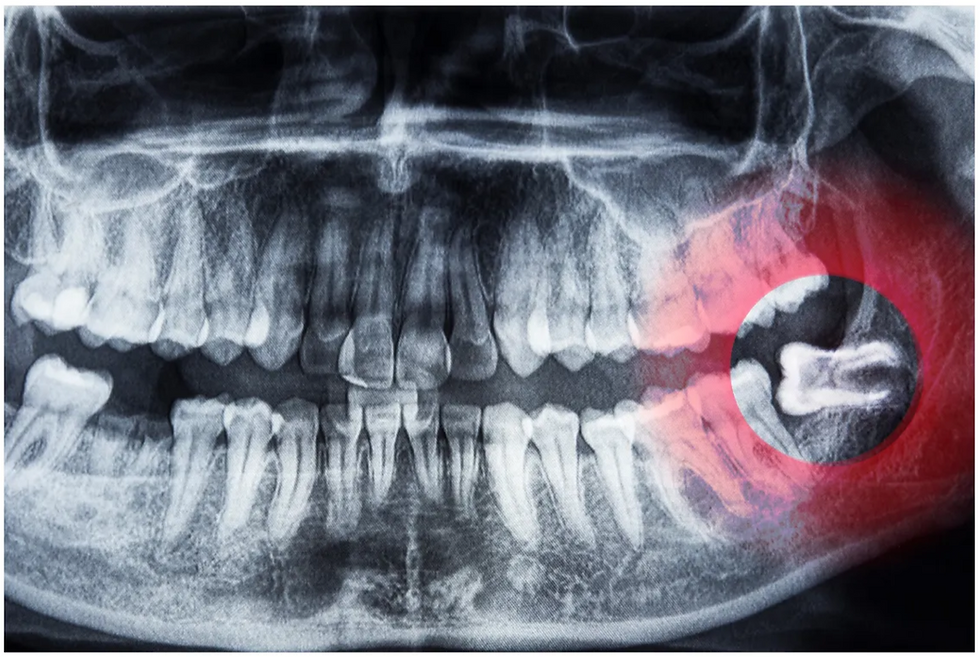Wisdom Teeth: Do They Really Need to Be Removed?
- lambertbertille14
- Aug 21, 2025
- 3 min read

During your routine visit to the dentist, did they mention your wisdom teeth? Or are you feeling discomfort at the back of your mouth? Unusual sensitivity, the feeling that a tooth is "pushing" under the gum, or a slight rubbing sensation with your tongue?
If you're between 17 and 25 years old, this is no coincidence: it's generally at this age that these teeth start making themselves known. But should you leave them alone or anticipate extraction?
The team at Rodde & Associates practice in Schifflange helps you understand what you really need to know about these teeth that aren't quite like the others.
Why are they called "wisdom teeth"?
Wisdom teeth are the third molars, located at the very back of the mouth. They appear between ages 17 and 25, a period traditionally associated with entering adulthood, hence their name.
But unlike other teeth, their presence is highly variable. Some people have four, others only one or two, and about 35% will never have any.
An evolutionary heritage that has become obsolete
Our ancestors had wider jaws, adapted to a hard, unprocessed diet. Wisdom teeth were then useful for chewing effectively. Today, our jaws have become narrower, and our diet softer.
Result: there isn't always enough room to accommodate these teeth. This explains why 85% of wisdom teeth must be extracted at some point.
What signs should alert you?
For some people, eruption is silent. For others, it's accompanied by easily recognizable signs:
Persistent pain or pressure at the back of the mouth
Red, swollen or sensitive gums
Cheek swollen on one side only
Bad breath, unpleasant taste
Fever or difficulty opening the mouth (trismus)
A panoramic X-ray allows visualization of the exact position of the teeth and anticipates complications.
What are the risks if we do nothing?
Even without pain, a poorly oriented or semi-impacted wisdom tooth can cause:
Recurring infections (pericoronitis)
Cyst formation in the jaw
Cavities on the adjacent tooth, difficult to clean
Displacement or loosening of other teeth
Hygiene problems due to a position too far back
Should they be systematically extracted?
No, not in all cases.
If wisdom teeth are well positioned, fully erupted and easy to clean, simple regular monitoring is sufficient.
But if there's a lack of space, pain, infection or risk to adjacent teeth, extraction is strongly recommended.
It's often simpler and better tolerated between ages 16 and 20, before complete root formation.
The procedure is performed under local anesthesia and duration varies from 20 to 40 minutes depending on the case.
And after extraction? What you need to know
Initial healing generally takes 3 to 7 days. Complete bone healing is observed from 3 months onwards.
During this period:
Apply ice to the cheek to limit swelling (especially the first 24 hours)
Adopt a soft diet (purees, soups, compotes...)
Maintain good oral hygiene, without brushing directly on the operated area
Avoid tobacco, alcohol and very hot foods
Plenty of rest to allow your body to recover
Post-operative follow-up is always scheduled at the practice to check healing.
In summary
Wisdom teeth may never cause problems
But in most cases, they become troublesome in the long term
An X-ray allows for personalized diagnosis
Extraction is often simpler before complications appear
And proper follow-up ensures quick and painless recovery
At Rodde & Associates, we take the time to evaluate your situation and accompany you at every step, from radiological assessment to post-extraction follow-up.
📍 The practice welcomes you in Schifflange, near Dudelange, Kayl, Mondercange and Esch-sur-Alzette.
📞 Do you have doubts, pain, or a cheek that's starting to swell?
Call us at (+352) 26 74 57 80
📩 Or write to us at contact@roddeassocies.com



Excellent post! A Root canal in Sharjah can completely change the way you feel about dental treatments. With their modern approach and expert care, the procedure is smooth and comfortable. The team ensures you get the best long-term results while maintaining a welcoming, professional environment.